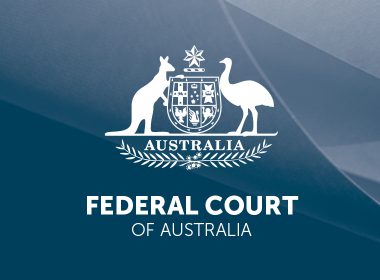Key decisions
- Fairfield Pastoral Holdings Pty Ltd as the trustee of the Piney Ridge Trust v Van Niekerk [2025] FCAFC 25 (David Townsend)
- Thakur v Minister for Immigration and Multicultural Affairs [2025] FCA 201 (Paris Hart)
ANSHUN ESTOPPEL
Leave to amend pleadings refused – effect of refusal of leave to amend on whether estoppel arises – special circumstances
In Fairfield Pastoral Holdings Pty Ltd as the trustee of the Piney Ridge Trust v Van Niekerk [2025] FCAFC 25 (‘Van Niekerk’), the Full Court of the Federal Court of Australia (Cheeseman, Goodman and McEvoy JJ) considered whether an Anshun estoppel arises if a party, after seeking and being refused leave to amend its pleadings in a prior proceeding, seeks to plead that very matter in a subsequent proceeding. The Court also considered whether, if an Anshun estoppel does arise, the refusal of leave to amend in the prior proceeding would constitute ‘special circumstances’ requiring the Court to permit the matter to be raised in the subsequent proceeding (i.e. overriding the estoppel that would otherwise apply).
Facts
The two proceedings at issue emerged from a property investment trust, the Piney Ridge Trust, of which the trustee was Fairfield Pastoral Holdings Pty Ltd (‘FPH’). In 2016, FPH acquired a certain property (‘Lot 2’) purportedly in its capacity as trustee. In 2017, FPH entered into a contract to purchase another property (‘Whale Beach Property’), again purportedly in its capacity as trustee. FPH borrowed money from National Australia Bank (‘NAB’) to fund part of the deposit for the Whale Beach Property, and the loan (‘Whale Beach Loan’) was secured by a mortgage over Lot 2. The purchase of the Whale Beach Property ultimately did not complete due to FPH’s inability to secure funding for the balance of the purchase price, and FPH was left with an obligation to repay the Whale Beach Loan and pay the interest thereon, as well as the loss of the deposit.
Relations between the appointor and primary beneficiary of the trust, Ms Van Niekerk, and the sole director of FPH soured. A dispute arose as to the purported removal and replacement of FPH as trustee, begetting the proceeding Fairfield Pastoral Holdings Pty Ltd v Ridge Estate Pty Ltd (No 4) [2022] FCA 1 (‘Ridge Estate’). In the course of Ridge Estate, leave was granted in 2020 to FPH to amend its pleadings to include a claim for relief in respect of the Whale Beach Loan, but FPH chose not to actually amend its pleadings. Prior to trial, the judge in Ridge Estate ordered the judicial sale of Lot 2 with the net proceeds of sale to be paid into Court. Due to a misdescription in the evidence of the sole director of FPH, amongst the deductions from the proceeds of sale of Lot 2 was the paying out of the principal owing on the Whale Beach Loan. Neither the Court nor the other side was aware of this until after it had occurred.
Subsequently, around a fortnight before the trial in Ridge Estate was to commence, FPH again sought leave to amend its pleadings to plead its entitlement to indemnification in respect of amounts for the purchase of the Whale Beach Property, including, relevantly, the interest due on the Whale Beach Loan. Leave was refused on the basis of the delay in making the application, the lack of explanation for why the earlier grant of leave had not been utilised and the prejudice to the other side so close to trial. At trial, there was no evidence to establish the capacity in which FPH entered into the Whale Beach Loan, and hence any right it might have to indemnification in respect thereof. Ultimately, judgment in Ridge Estate confirmed that FPH was the trustee of the Piney Ridge Trust, but left open to FPH to establish, in a later proceeding, its right to indemnification out of any of the net proceeds of sale still held in Court (with the judge explicitly declining to make any comment as to the viability of such an action).
FPH then initiated the present proceeding but at trial it was held FPH was precluded by Anshun estoppel from pleading it had a right to indemnification in respect of the interest due under the Whale Beach Loan.
Anshun estoppel
It will be recalled that Anshun estoppel (deriving its name from the High Court decision in Port of Melbourne Authority v Anshun Pty Ltd (1981) 147 CLR 589, although tracing its origin back much further in English jurisprudence):
‘operates to preclude the assertion of a claim, or the raising of an issue of fact or law, if that claim or issue was so connected with the subject matter of the first proceeding as to have made it unreasonable in the context of that first proceeding for the claim not to have been made or the issue not to have been raised in that proceeding’ (Tomlinson v Ramsay Food Processing Pty Ltd [2015] HCA 28 at [22]).
Anshun estoppel, being concerned with matters which could have been, should have been, but were not determined in the prior proceeding, is distinct from the other two species of estoppel encountered in this field of law: res judicata or cause of action estoppel and issue estoppel, both of which concern matters that were determined in the prior proceeding. Emerging from this, another distinct feature of Anshun estoppel is there is a judicial discretion to not regard a pleading as subject to the estoppel where there exists ‘special circumstances that prevail to permit a party to raise the issue in a subsequent proceeding’ (Wong v Minister for Immigration, Multicultural & Indigenous Affairs [2004] FCAFC 242 at [38]). In Van Niekerk, the trial judge held the capacity in which FPH entered into the Whale Beach Loan was a matter which could and should have been raised in Ridge Estate, it was unreasonable for FPH not to have raised it in Ridge Estate, and the rejection of the belated application for leave to amend did not constitute ‘special circumstances’. The issue could thus not be pleaded in Van Niekerk. FPH appealed to the Full Court.
Decision
The Full Court, in joint judgment, dismissed the appeal, holding there was no error in the trial judge’s reasoning below. The question of whether or not FPH was entitled to indemnification was one which could, and should, have been raised in Ridge Estate, as evidenced by the fact of leave to amend having been granted in 2020 to allow that to be pleaded (although the leave was not utilised), and the fact of the 2021 application for leave to allow the right to indemnification to be pleaded (which was refused). It was appropriate that the capacity in which FPH entered into the Whale Beach Loan, and any right to indemnity in respect thereof (whether for principal or interest), should have been litigated in Ridge Estate, and it was unreasonable not to have raised it there.
It would be anomalous if a party could avoid an Anshun estoppel merely by virtue of having sought to raise the issue by means of a late amendment.
Moreover, the Full Court held the mere fact that FPH had belatedly sought, but been refused, leave to amend its pleadings in Ridge Estate to include the claim for indemnification was not a basis to say Anshun estoppel did not arise against FPH in Van Niekerk, nor did it constitute ‘special circumstances’ such as to disapply the Anshun estoppel otherwise operating. In so doing, the Full Court interpreted the authority cited in favour of that proposition by the appellant (certain comments in the judgment of Powell JA in Macquarie Bank Ltd v National Mutual Life Association of Australia Ltd (1996) 40 NSWLR 543) as being not a statement of general principle but merely obiter dicta on the facts in the circumstances of that particular case (at [46]). The Full Court held:
‘It would be anomalous if a party could avoid an Anshun estoppel merely by virtue of having sought to raise the issue by means of a late amendment. This is especially so in light of the now entirely orthodox recognition of the importance of timely, cost effective and efficient conduct of modern civil litigation’ (at [44]).
It went on to cite the well-known cases of UBS AG v Tyne (2018) [2018] HCA 45 and Aon Risk Services Australia Ltd v Australian National University [2009] HCA 27 (‘Aon Risk v ANU’) on case management principles and late amendments. Although the instant case concerned a late application for leave to amend, the Full Court appeared to regard the point as relating to any application for leave to amend which was refused (because the other party successfully opposed it):
‘an Anshun estoppel can arise where a point was not litigated, not through negligence, inadvertence or accident (or because of deliberate choice), but because a party successful resisted it being raised’ (at [54]).
Significance
Where leave to amend has been granted but a party elects not to make certain amendments, that party should understand this deliberate forensic choice may have consequences not only for the instant proceeding, but – by way of Anshun estoppel – in any subsequent proceeding attempting to pursue the issue that could have been the subject of amendment in the first proceeding.
Further, if a party wishes to amend its pleadings, an application for leave to amend should be made promptly and as early as reasonably possible in the proceeding. If the party leaves it until late in the proceeding to make such an application, the case management principles dominant since Aon Risk v ANU may now have an extended effect. They will not only tell against the grant of late leave to amend in that proceeding, but may also cause an Anshun estoppel to operate in respect of any subsequent proceeding commenced seeking that relief, inasmuch as the Court is likely to be unpersuaded the refusal of leave for late amendment constitutes ‘special circumstances’ such as to disapply the otherwise operative Anshun estoppel. As legal commentators have been repeating for some centuries: ‘vigilantibus, non dormientibus, jura subveniunt’. Do not get caught sleeping on your rights.
MIGRATION
Judicial review of AAT decision refusing employer nomination visa – compassionate and compelling circumstances justified waiver of public interest criteria – alleged jurisdictional error
In Thakur v Minister for Immigration and Multicultural Affairs [2025] FCA 201, Mr Thakur, the first appellant, applied for a Regional Employer Nomination (Class RN) (Subclass 187) visa to work as a cook. His wife, the second appellant, joined the application.
Mr Thakur conceded his supporting documents were bogus. This meant he did not satisfy the public interest criterion (‘PIC’) for the grant of a visa in clause 4020 in Schedule 4 to the Migration Regulations 1994 (Cth) (‘Regulations’).
However, the first respondent (‘Minister’) could waive the PIC if satisfied compassionate or compelling circumstances affecting the interests of an Australian citizen justified the granting of the visa. In this case, the Administrative Appeals Tribunal (‘AAT’) decided the requirement should be waived because of the circumstances of the appellants’ young daughter as an Australian citizen.
However, the AAT upheld the decision of the Minister’s delegate to refuse the visa because the applicant failed to satisfy another requirement of clause 187.233(3) of Schedule 2 of the Regulations: that the Minister approve the employer nomination.
On appeal to the Federal Circuit and Family Court of Australia (‘Circuit Court’), the appellants contended the AAT should have granted the visa given it accepted there were compassionate or compelling circumstances in respect of their daughter. They also argued the AAT failed to consider that Mr Thakur could not support his family financially if he were to be returned to India. The Circuit Court dismissed the application.
The grounds of appeal
Mr Thakar and his wife were self-represented. They argued the following:
- the primary judge failed to address the AAT’s error in not considering all the relevant materials relating to PIC waiver in clause 4020(1). Specifically, the primary judge failed to consider whether the compassionate and compelling circumstances affecting the appellants’ daughter justified the granting of the visa pursuant to clause 4020(4); and
- the primary judge failed to consider the first appellant was 51 years old and did not have any earning capacity at time of the decision of the AAT. Therefore, it was highly likely he would not be able to financially support his family in terms of education and healthcare, as there is no social welfare or any such safety net for the unemployed in India.
His Honour observed clause 4020 was not the only criterion that must be satisfied for a visa to be granted.
Decision
Jackson J noted two aspects to ground 1. The first was the primary judge failed to consider whether there were compassionate and compelling circumstances affecting an Australian citizen which could have empowered the AAT to waive compliance with PIC under Clause 4020(1). The second aspect was that, having considered those circumstances, the AAT should have considered granting the visa or granted it. His Honour noted a parallel ground of review before the primary judge that ‘the Tribunal “fell into jurisdictional error in failing to complete its decision-making process”’ so completing the process required the granting of the visa (at [8]).
His Honour observed, with respect to the ground of review which corresponded to ground 1, the primary judge found the Tribunal had already considered all the matters set out below which were raised by Mr Thakur in relation to the waiver of PIC under clause 4020(1), in detail:
- letters and school reports regarding the academic progress of the appellants’ children (including their son although only the daughter was an Australian citizen) in Australia and their integration into Australia;
- difficulties they would have in integrating or re-integrating into Indian society, and that it would be difficult for Mr Thakur to find a job and provide for his family there as there is no welfare system in India;
- pursuant to the Convention on the Rights of the Child, decision-makers should hold the best interests of the children as a primary consideration in any decisions that affect them and, in this case, those best interests could only be protected if the children continued their education in Australia;
- it was not safe in India due to COVID-19 (the AAT hearing took place in July 2021) and the two children have asthma that could be exacerbated by COVID-19; and
- Mr Thakur’s concern about the prevalence of sexual assaults on young girls in India.
His Honour also stated that matters raised by Mr Thakur in his oral submissions were substantially the very matters the AAT considered and they did not raise any different matters. His Honour found the primary judge was correct in finding the AAT had considered the compassionate and compelling circumstances that affected the appellants’ daughter. Also, the primary judge pointed out the AAT decided to waive the need for compliance with clause 4020(1) because of the severity of the COVID-19 pandemic in India at the time. Therefore, the appellants failed to show error in the primary judge’s conclusion.
His Honour stated the second aspect of the first ground of appeal depended on a construction of clause 4020(4) which provided that:
‘The Minister may waive the requirements of any or all of paragraphs (1)(a) or (b) and subclause (2) if satisfied that:
(a) compelling circumstances that affect the interests of Australia; or
(b) compassionate or compelling circumstances that affect the interests of an Australian citizen, an Australian permanent resident or an eligible New Zealand citizen;
justify the granting of the visa’.
Therefore, the Minister must be satisfied the circumstances justify the granting of the visa to be able to waive the relevant requirements.
His Honour observed clause 4020 was not the only criterion that must be satisfied for a visa to be granted. Mr Thakur’s application was subject to the criteria in clauses 187.233(1) and 187.233(2) including that the Minister had approved a nomination of the visa applicant made by his or her prospective employer. That criterion was not satisfied here because Mr Thakur’s prospective employer was informed the application for approval of the nomination of Mr Thakur and his family was refused on 22 February 2018. Therefore, pursuant to section 65(1)(b) of the Migration Act 1958 (Cth), the AAT was required to refuse to grant the visa even though it was satisfied the circumstances of Mr Thakur’s daughter justified the granting of the visa.
With respect to ground 2 of the appeal, his Honour stated it corresponded to two grounds of review in the Circuit Court concerning the AAT’s consideration of Mr Thakur’s prospects of finding employment and financially supporting his family if he were returned to India. One ground also contained the need to obtain healthcare and a suitable education for the children in India, and the absence of any social welfare system.
His Honour stated those submissions were considered by the AAT but rejected by it for the following reasons:
- the Tribunal held Mr Thakur had extensive experience as a chef with reputable restaurants and hotels in India and Australia which would give him a good chance to secure employment to provide for his family, including his daughter; and
- the fact Mr Thakur was working as a courier driver as he was not able to find full employment in hospitality in Australia indicated he was ‘a resourceful person who, despite the difficulties’, could find other types of employment in India to support his family (at [26]).
Therefore, the appellants failed to establish ground 2. His Honour found the primary judge was correct in his findings in relation to this ground.
The appeal was dismissed with a lump sum costs order of $5,000.00.




